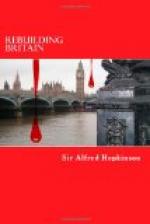It is, however, not to be forgotten that men acting in the mass, just as men acting individually, may act under sudden impulse, may do under the influence of temporary passion, even of a generous emotion, things which they would regret afterwards, and feel to be an error. Some checks on such sudden action are most essential in a democracy, because there is no appeal from its decision. A reverence for tradition, for those rules of conduct which have stood the test of time, is one restraining influence, but more formal restraints on sudden decisions and violent changes are necessary. A single vote of a popular assembly may not represent the well-considered judgment and permanent will of the people. Steps may be taken which it is impossible to recall. To insist on an appeal from “Philip drunk to Philip sober” is not to deprive him of his real liberty. It is a safeguard, not an infringement of the principles of true democracy, to provide some body of men of experience who can exercise an independent judgment, and who, when some violent change is proposed, have the right and the duty to reply in effect:
Old things may not be therefore
true,
Oh brother men, nor yet the
new;
Ah, still awhile the old thought
retain,
And yet consider it again.
Such a justification, such a statement of the function of a Second Chamber, not directly elected, may provoke a histrionic smile among extreme advocates of so-called popular rights, but has never evoked an argument which can displace it as based on sound reason and common sense. There are some changes, too, which ought not to be made without a specific appeal to the people on that particular issue. To make them as part of the programme, as one plank in the platform of a party dominant for the moment, is not to execute but to evade the real will of the nation. We know by experience how the vote of a popular representative assembly may represent the opinion of “a bare majority of a bare majority;” conceivably anything over one-eighth of the nation. A committee is elected by some eager partisans supposed to represent a party. That party perhaps represents a bare majority of the constituency. The caucus chooses a candidate whose views suit a bare majority of its members who hold the most extreme views. He and others go to Parliament as representing one party, and a majority of such members decides what policy shall be adopted. Party discipline compels the acquiescence of the rest. The machine is cleverly constructed to make the will of certain party managers of mere sections of the constituencies the dominant factor. No wonder that they denounce Proportional Representation as a dangerous fad. Undoubtedly the will of the people must prevail, but the exercise of that will should depend on and be the result of their own deliberate judgment. Whether what is done is a blessing or curse depends not on whether it is the act of an autocrat, of an aristocracy, or of a democracy, but on the character of the act and the spirit which prompts it. A great audience in London recently heard the true position summed up in few words—I quote Dr. Campbell Morgan from memory—“It is said we want to make the world safe for democracy. What we really need is to make democracy safe for the world.”




